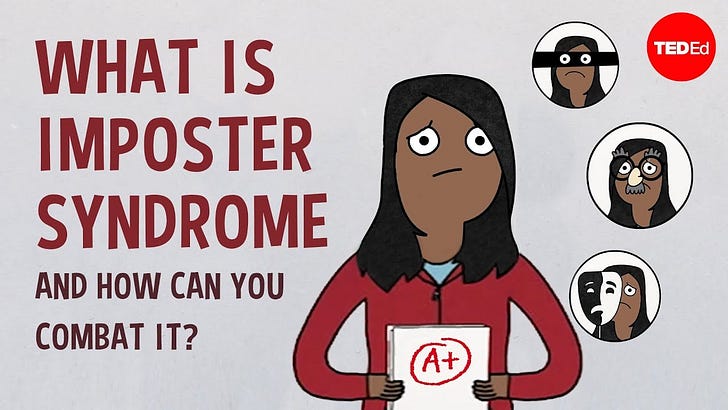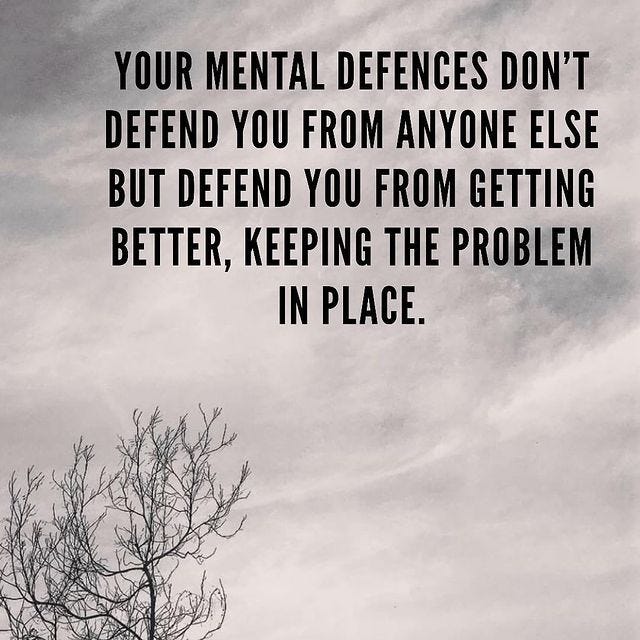26th September
2:30 AM
“I am looking at all the re-shares, emails, and DMs I got on the essay about moving on that I published. People are actually liking it. This one person told me she wants me to write a book. Should I not have done this? Should I not have written the essay? Should I never have started the newsletter?
What if all these people get to know I am struggling to move on from so many things myself? What if they find out I am writing about moving on when I am understanding how to move on?
Will they find out I am a hypocrite?
Will they get to know I am a fraud?
Should I delete the essay and forget it ever existed?”
This is a small snippet from what it’s like to live in the mind of someone with Imposter Syndrome.
In the essay today, I thought I would start talking about a topic that I never did – to put another story of dealing with Imposter Syndrome among many other stories already out there. This essay is co-authored by my friend and an amazing therapist and psychologist - Varsha Tekwani.
Around six months ago, I started having peculiar feelings about the way I looked at myself and my work. I have always enjoyed writing, and always doubted my content and editing but only to learn more and be better. Seldom had I questioned myself and belittled the work I did and so it was a very new feeling for me.
I don’t know if you will relate to me in this essay, but I request you to read it fully. Sharing vulnerabilities takes courage and I tried writing my anxious moments for a reason.
Imposter syndrome can be defined as a collection of feelings of inadequacy that persist despite evident success. ‘Imposters’ suffer from chronic self-doubt and a sense of intellectual fraudulence that override any feelings of success or external proof of their competence.
Harvard Business Review
I think at some point in our lives we all doubt ourselves. Whether or not we are good enough for the job. Whether or not we are doing justice to our salary. Have we studied enough for the test or did we just get lucky? These questions took up a considerable amount of my time. This is when I reached out to my friend and therapist and she suggested that I take a test online.
This is what I found!
By chance, I came across an Instagram post about Imposter Syndrome of a famous social media influencer Dolly Singh on reaching 1M followers and she aptly described what it’s like to be in the head of someone with Imposter Syndrome (IS).
When I started reading more about Imposter Syndrome I realised it’s a common mental health issue. I wonder why I never heard of it before.
An estimated 70% of people experience these impostor feelings at some point in their lives, according to a review article published in the International Journal of Behavioral Science. Impostor syndrome affects all kinds of people from all parts of life: women, men, medical students, marketing managers, actors and executives.
TIME
Studies have also found that Imposter Syndrome affects men, women, and minority groups disproportionately. Imposter Syndrome is more prevalent among women while it hits differently to men. This may be because of the way men and women grow up in an atmosphere that constantly demands different things out of them. Because of the patriarchal society that we live in, women generally have to work more than men to prove their worth – even to themselves. This may lead to them feeling inadequate about their potential.
Let’s take a moment to think about certain questions, from a diagnostics perspective.
Why would anyone be reluctant to accept appreciation and compliments?
Why would anyone be unhappy when given good feedback when happiness is generally what you feel with such feedback?
The answer may lie in the connection with one’s childhood, adulthood, or recent past. Your primary caretakers (parents/family), your close circle of people and their behaviour contributes to your mindset. Imposter Syndrome makes one not feel worthy of their success. If a person is showered with appreciation and encouragement from their immediate social circle, it might not be as new or overwhelming when you get success outside this circle. Since you are used to appreciation, you would feel worthy and deserving. However, when this link breaks there is a conflict. When your primary circle’s opinions or behaviour of you comes in conflict with those of the extended circle of people, there is a disconnect which may be a primary source of Imposter Syndrome. There is a strong belief system one has based on their parents’ feedback, and this comes in conflict with the outside feedback.
One way to work on Imposter Syndrome is to consciously look at the conflict between the immediate circle of people (family and close friends) and the extended circle of people (friends, colleagues, peers etc). One has to work on and treat this gap to overcome Imposter Syndrome.
What are the other ways of fighting against Imposter Syndrome:
Talk to a colleague or friend. Has she felt like an impostor, too? Knowing this is a thing that others feel will help make it just that: a thing, but not your thing. If that doubtful voice begins to creep into your head, repeat: “It’s not me, it’s the impostor syndrome talking.”
Unsubscribe from doubt. In his book “Originals: How Non-Conformists Move the World,” Adam Grant, a professor of management and psychology at the Wharton School at the University of Pennsylvania, describes two kinds of doubt: self-doubt, which causes you to freeze up, and idea doubt, which can motivate people to refine, test or experiment with a good idea. Try to turn self-doubt into idea doubt by telling yourself: It’s not that I’m bad, it’s that the first few drafts of any idea are always bad — and I’m just not there yet.
Decide to be confident. Literally, make the choice to be confident. Raise your hand. Volunteer your expertise. When you start spiralling into self-doubt, force yourself to write down three things you've done well. (If three isn’t enough to ease your doubts, write three more.) And actually hand-write them. A 2014 study shows that people remember things better when they've written rather than typed them.
Remind yourself you’re good at what you do. I have a folder in my inbox called “fun/nice.” It’s full of praise I’ve received over the years, to remind myself of my value when I need a quick confidence boost. Jessica Kirkpatrick, a data scientist based in Berkeley, Calif., told me she employs something called the “rubber band trick.” She wears a rubber band around her wrist and snaps it every time she has an impostor thought. It’s the same premise as Pavlov’s dogs: This action sends feedback to your brain, which eventually stops the thoughts that trigger the action. “Change your thoughts, and the brain will follow,” she said.
Forbes
I am still not over Imposter Syndrome. After publishing every issue, I get anxious. Every message of appreciation brings along anxiety and fear. But I am glad I had the courage to accept the problem and a will to work sincerely on myself.
Note: I am utterly thankful to Varsha for spending time on this essay and giving her inputs as a co-author. She has always been there for me. Last night we almost did a therapy session at 2 AM and I am so thankful that she is always there for her clients. If you are seeking any kind of mental health advice or professional treatment, you can always approach her. She has been one of the kindest, empathetic and extremely knowledgeable person and therapist.
You can reach out to her at:
Instagram Handle: https://www.instagram.com/psychologist_varsha.tekwani/
Email id: varshatekwani8889@gmail.com
What I liked reading this week:
I read a very interesting essay on John Rawls’ Theory of Justice. Farnam Street blog broke the concepts down and explored ideas around fairness and justice - which is what I needed to read to make myself feel better. If you want to read something intellectual today, let it be this.
In other more distressing news, our beloved Central Government went ahead and opposed equality for same-sex marriage and very ‘nicely’ discarded the idea saying the basic order of an Indian family is a biological man and a biological woman and the patriarchy and this structure of hierarchy can come under danger if same-sex couples get married. If you understood the logic and rationality behind this idea, please please please write back to me and explain because to me this is bullshit. Anyway, you may read some takes on the issue here.
As ridiculous as this seems (I can’t seem to remain neutral in such cases), I request you to read and form your own opinions. How important are values to us? Who decides these values? And why do they have a problem with recognising marital rape then? Where are our Indian values now?
Remember the Delhi Riots of Last Year
Today, I would also like to remember what happened last year in Delhi. The riots killed innocent people and perhaps damaged them mentally and emotionally for a long time. Let this be a reminder that we do not need hate anymore. Let this remind us of the innocent people who lost their homes, their mental health, and some - their lives. Let our prayers be for their well-being and peace. I read a piece from The Atlantic and I am going to leave it here for you to read.
https://www.theatlantic.com/ideas/archive/2020/02/what-happened-delhi-was-pogrom/607198/
Indians are working the longest, with the least earnings and practically no time for leisure. The International Labour Organisation recently reported how Indians work hard and are not compensated enough in terms of money or time or themselves.
ANNOUNCEMENT:
All Good Things Must Come to an End:
I started Hit and Miss as an experiment, something I would do for a few months and then stop. I had planned for publishing ten issues but somehow we have reached the thirteenth. I could not be more glad that it happened. However, since I had planned on making this an experimental project only, we are down to the last two issues before we call it a day.
For the last issue, I wish to sincerely request you to write something back to me that I can publish. How you may have enjoyed reading, thinking through Hit and Miss. I would be genuinely thankful to you for your reviews, and close the newsletter with you - the most important part of Hit and Miss. If you’re comfortable, please do write back to me at thehitandmiss@gmail.com or tanishasvenkani@gmail.com and I would love to publish your responses. This would mean a lot to me.
For now, thanks for reading. <3
References:
https://time.com/5312483/how-to-deal-with-impostor-syndrome/
https://so06.tci-thaijo.org/index.php/IJBS/article/view/521/pdf
https://hbr.org/2008/05/overcoming-imposter-syndrome
https://www.nytimes.com/guides/working-womans-handbook/overcome-impostor-syndrome
https://www.npr.org/2021/01/22/959656202/5-steps-to-shake-the-feeling-that-youre-an-impostor










Thanks for writing on this subject Tanisha!